 Last week I proposed a definition of translational research and started to explore the problem of defining research itself. Previous definitions suggest six headings, relevant to all types of research.
Last week I proposed a definition of translational research and started to explore the problem of defining research itself. Previous definitions suggest six headings, relevant to all types of research.
Pre-requisites Successful research requires certain personal attributes and cognitive processes: curiosity or wondering (how, whether, why, etc), both of which imply a desire to know or learn; a prepared focused mind capable of critical evaluation, particularly self-criticism, a willingness to discard prejudices, an ability to synthesise and store ideas, and an ability to take different perspectives on the same topic; the ability to be creative, implying the possession of vision in the formulation of goals, an ability to use a wide range of resources and knowledge in synthesising evidence and formulating new ideas, with an ability to communicate those ideas; and a suitable temperament, particularly marked by a thirst for knowledge from many different sources, patience and perseverance, pride in accuracy and excellence, preparedness to collaborate, and preparedness to take intellectual risks, coupled with academic humility, but not at the expense of other attributes.
The purposes of research Research may involve: descriptions of phenomena; making discoveries or inventing things; solving problems; and testing hypotheses (verification and falsification).
Domains of research These are explorations of the physical nature of things, the biological nature of things, conceptual constructs, cultural constructs, and social constructs.
Things to be discovered For these I use as shorthand the Latin word invenienda: what has happened in the past; laws or theorems that govern things; how things are constituted or respond; how things are caused or work (mechanisms); and what people think. Linked to these are the processes of development, diffusion, dissemination, and implementation, i.e. how findings can be passed on and translated into outcomes of practical use, as I have discussed in relation to translational research.
Methods involved The requisite methods are: creative reflection (Thinking, including thought experiments); enquiry (Asking, including qualitative research); observation (Sensing, primarily seeing, but also touching, tasting, hearing, smelling); experimentation (Testing, both laboratory and field work); and evaluation/interpretation (Explaining). All this adds up to a TASTE for research.
Outcomes of research The outcomes of research and its practice are knowledge, skills, understanding, education/training, practical applications, and consequently expertise.
Using these headings, I have constructed an operational model of research (Figure 1) and populated it with examples (Figure 2).
Figure 1. An operational model of research derived from the six headings discussed in the text
Figure 2. The operational model of research from Figure 1, populated with practical examples [bracketed in italics]; these examples are not exhaustive, and some could be included under more than one heading
From this approach come two intensional definitions of research: one extended, one compact:
research, n. /rᵻˈsəːtʃ/ a systematic activity in which wondering, a critical and prepared mind, and creativity unite in a search for skills and understanding about what has happened, what people think, the laws or theorems that govern things, how things are, are caused, or work, or how findings can be translated into outcomes of practical use, in which phenomenology, innovation, hypothesis testing, and problem solving play key roles; it includes creative reflection, enquiry, observation, or experimentation involving investigation of conceptual, natural, cultural, or social phenomena, linked to evaluation and interpretation, and it leads to dissemination and implementation [French recherche, thorough investigation, Late Latin circare, to go around]
and
research, n. /rᵻˈsəːtʃ/ a systematic activity in which cognitive processes are combined with physical methods in a search for outcomes of theoretical or practical value. [French recherche, thorough investigation, Late Latin circare, to go around]
These definitions are not restricted to specific types of research, such as have been dichotomously labelled basic, fundamental, intrinsic, and non-mission oriented, as opposed to applied, targeted, programmatic, systematic, categorical, and mission oriented. Nor does it imply that research processes are either linear or non-linear.
Medical research is research of any kind that is relevant to human health or ill health, symptomatic or asymptomatic.
Jeffrey Aronson is a clinical pharmacologist, working in the Centre for Evidence Based Medicine in Oxford’s Nuffield Department of Primary Care Health Sciences. He is also president emeritus of the British Pharmacological Society.
Competing interests: None declared.

